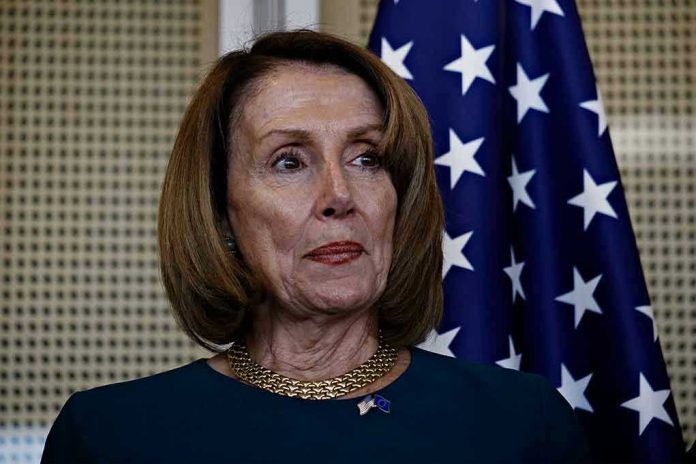
A multimillion-dollar fintech company now lets Americans profit by mimicking Nancy Pelosi’s controversial stock trades—while Congress stalls on real reform and trust in government reaches new lows.
Story Snapshot
- Nancy Pelosi’s lucrative stock trades have inspired a viral app, “Pelosi Tracker,” now managing over $531 million in assets.
- Public outrage over congressional stock trading fuels bipartisan calls for stricter ethics laws, but legislative reform remains stalled.
- Retail investors are flocking to copy trading, betting that following politicians’ moves will beat the market.
- Critics warn that this phenomenon deepens distrust in Congress and undermines faith in the system.
Pelosi’s Trades Spark a Fintech Gold Rush
Nancy Pelosi’s stock trading record from 2020 through 2025 has consistently outperformed the market, especially in the tech and AI sectors. Her well-timed trades in giants like NVIDIA, Microsoft, and Apple, often coinciding with key legislative moments, have become a national spectacle.
This pattern of “uncanny” success, amplified by watchdog groups and viral social media accounts, has turned Pelosi into the face of congressional stock trading controversy. The public’s fascination—fueled by frustration over political privilege—created the perfect storm for the launch of the “Pelosi Tracker” app by the company Autopilot, which lets everyday investors copy the trades of lawmakers like Pelosi in real time.
The app’s growth has been explosive, with over 127,000 users and more than $531 million in assets managed, signaling a major shift in how Americans view both Wall Street and Washington.
While the STOCK Act of 2012 was intended to curb insider trading on Capitol Hill, numerous loopholes and delayed reporting requirements have left the door wide open for questionable activity. Pelosi and her husband, a seasoned investor, have repeatedly defended their trading as legal and fully disclosed.
Meanwhile, Autopilot’s founders seized on public demand for transparency and accountability, building a platform that monetizes the very outrage lawmakers sparked. The app warns users that trade data is delayed and should be considered entertainment rather than financial advice, but this hasn’t slowed its viral spread.
Retail investors—frustrated by inflation, government overreach, and what they see as a rigged system—are eager to follow political “insiders” for a shot at outsized returns.
Copy Trading, Congressional Ethics, and Calls for Reform
The meteoric rise of copy trading apps like “Pelosi Tracker” is more than a financial fad—it’s a direct response to Americans’ deepening skepticism towards Congress. Watchdog groups and bipartisan reformers argue that lawmakers’ ability to profit from market-moving information undermines public trust and violates the spirit, if not the letter, of the Constitution’s ethical standards.
The PELOSI Act and similar bills, intended to ban or strictly regulate congressional trading, have been debated throughout 2024 and 2025, yet remain stalled amid political gridlock. This inaction only heightens public cynicism, as millions pour into apps that make a game out of tracking politicians’ wealth. For many, it’s further evidence of how the “swamp” protects its own while average Americans struggle with the consequences of misguided fiscal policies.
Expert analysis highlights that Pelosi’s trades have consistently outperformed the S&P 500, raising legitimate questions about whether lawmakers possess unfair informational advantages.
Financial professionals caution that delayed trade disclosures make it unlikely that copycat investors will replicate the original gains—but the appetite for these products keeps growing. Ethics scholars are divided: some believe greater transparency is enough, while others insist that only blind trusts or outright bans can restore faith in Congress.
Regardless, the intersection of political finance, public outrage, and retail investing is now reshaping both Wall Street and Main Street.
Public Trust, Political Consequences, and the Road Ahead
The controversy over congressional stock trading has become a flashpoint for broader frustrations about government integrity, economic inequality, and the erosion of American values. The Autopilot app’s runaway success—driven by interest in Pelosi’s trades—underscores just how far public confidence has fallen.
Hundreds of millions of dollars now flow through platforms inspired by political controversy, and the fintech sector is capitalizing on the spectacle. Meanwhile, legislative efforts to restore trust remain mired in partisan wrangling. As the debate rages on, the real casualty may be Americans’ faith in their representatives and the hope that common-sense reforms will ever take hold. For conservatives and patriots who value transparency, accountability, and constitutional principles, the lesson is clear: when political elites refuse to police themselves, the American people will seek other ways to level the playing field.
Sources:
Millions in the Green: Inside Pelosi’s Unstoppable Trading Streak
Nancy Pelosi Stocks: The Ultimate Guide to Tracking Pelosi Trades
Nancy Pelosi stock trades spark legislation and investing app frenzy
Nancy Pelosi retires, but her stock tracker app is now a multimillion-dollar business

















